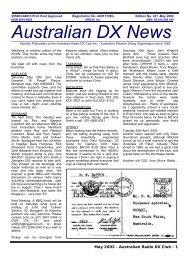Compleat Idiot's Guide to Getting Started
Compleat Idiot's Guide to Getting Started
Compleat Idiot's Guide to Getting Started
You also want an ePaper? Increase the reach of your titles
YUMPU automatically turns print PDFs into web optimized ePapers that Google loves.
COMPLEAT IDIOT’S GUIDE TO GETTING STARTED 6<br />
them, so sometimes they try <strong>to</strong> outshout<br />
each other.<br />
Technology <strong>to</strong> the rescue! To cope with<br />
this, purchase a radio with superior<br />
adjacent-channel rejection, also known as<br />
selectivity, and give preference <strong>to</strong> radios<br />
with synchronous selectable sideband.<br />
PASSPORT REPORTS, a major section of this<br />
book, tells you which stand out.<br />
One of the most pleasant things about<br />
world band radio is cruising up and down<br />
the airwaves. Daytime, you’ll find most<br />
stations above 11500 kHz; night, below<br />
16000 kHz. Tune slowly, savor the sound<br />
of foreign <strong>to</strong>ngues alongside English<br />
offerings. Enjoy the music, weigh the<br />
opinions of other peoples, hear the events<br />
that shape their lives and yours.<br />
If a station can’t be found or fades out,<br />
there is probably nothing wrong with your<br />
radio. The atmosphere’s sky-high ionosphere<br />
deflects world band signals<br />
earthward, whereupon they bounce back<br />
up <strong>to</strong> the ionosphere, and so on like a<br />
Chinese cowboys listen <strong>to</strong><br />
foreign broadcasts on<br />
their Tecsun world band<br />
radios. E.A. Hozour<br />
dribbled basketball until they get <strong>to</strong> your<br />
radio. This is why world band radio is so<br />
unencumbered—its signals don’t rely on<br />
cables or satellites or the Internet, just<br />
layers of ionized gases which have<br />
enveloped our planet for millions of years.<br />
World band is free from regulation, free<br />
from taxes, free from fees—and largely<br />
free from ads, as well.<br />
But nature’s ionosphere, like the weather,<br />
changes constantly, so world band stations<br />
have <strong>to</strong> adjust as best they can. The result<br />
is that broadcasters operate in different<br />
parts of the world band spectrum, depending<br />
upon the time of day and season of the<br />
year.<br />
That same changeability can also work in<br />
your favor, especially if you like <strong>to</strong> eavesdrop<br />
on signals not intended for your part<br />
of the world. Sometimes stations from<br />
exotic locales—places you would not<br />
ordinarily hear—become surprise arrivals<br />
at your radio, thanks <strong>to</strong> the shifting<br />
characteristics of the ionosphere.




